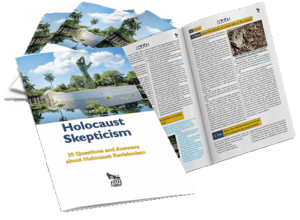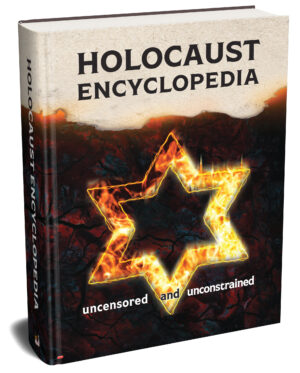Welcome to CODOH!
 Watch presentations of our 2026 Holocaust Summit (Feb. 7, 2026)
Watch presentations of our 2026 Holocaust Summit (Feb. 7, 2026)
The aim of the Committee for Open Debate on the Holocaust is to promote intellectual freedom permitting an uncensored and unimpeded, yet always civil discourse on the “Holocaust” narrative, and to offer a forum to those who contest the orthodox Holocaust narrative. As an introduction, we recommend:
- Our article “What Is the Best Introduction into Revisionism?“
- Our letter-size flyer “The Holocaust Controversy: The Case for Open Debate.”
- Our 20-page color brochure Holocaust Skepticism: 20 Questions and Answers about Holocaust Revisionism.
- Our 36-page info brochure The Holocaust: Facts versus Fictions.
- Or watch our brief intro video on the left below (1 min, 47 seconds), or our 29-minute video explaining what exactly this is, “the Holocaust” (bottom right), in the context of the revisionist Holocaust Encyclopedia, proudly sponsored by CODOH:
El Gran Tabu: Get to know CODOH’s founder Bradley Smith, and Germar Rudolf, who continues Brad’s legacy at CODOH, as well as Ernst Zündel, a major revisionist activist.
Always Hot: The new standard reference work summarizing in 591 nutshell entries the research results of skeptical Holocaust research. This 646-page letter-size “Nuke Book” gives you an uncensored and unconstrained look at all the pertinent evidence that upholds the orthodox Holocaust narrative: the true, the false, and the mendacious. It also exposes the various forces and influences that have dictated how this narrative was formed, and how it is protected from skeptical prying eyes. Learn about the biggest propaganda campaign mankind has ever seen, and how it braced the postwar world psychologically. This encyclopedia gives you all the information they ever wanted, and information you didn’t even know exists, right at your fingertips. Learn more…
CODOH is operated entirely by volunteers. If you believe you can help, please go to our Volunteer page to view the many ways you can participate, and please donate to help achieve our mission to repeal anti-Revisionist anti-free speech laws around the world:
Our Latest Blog Posts:
- 2026 ARMREG Holocaust Academy Summit7 February 2026, on FTJMedia.com Independent ∙ Fearless ∙ Uncensored ∙ Unconstrained Tackling the Most-Harmful Ideology Undermining Peace, Truth and Freedom Worldwide The Summit A table of all the presenters with their assigned time slots on February 7, 2026, and the starting time of the video containing the entire summit can be found below. Below this…
- Robert Faurisson International Prize 2026 (seventh edition)Ostuni, 29 January 2026 Dear friends, I am pleased to inform you that the Robert Faurisson International Prize 2026, seventh edition, took place successfully in Vichy on 25 January without any intrusion, impediment or disturbance from the Enemy (of man, nature, goodness, beauty and truth). After the customary tribute at 11 a.m. at the Professor’s…
- BREAKTHROUGH: Holocaust Skeptics Testify to House CommitteeIn late 2025, a bill was introduced in the New Hampshire House of Representatives to extend the authorization of this state’s Commission on Holocaust and Genocide Education. Seeing this as an opportunity, one of New Hampshire’s state representatives took a bold stand: Matthew Sabourin dit Choinière, currently representing New Hampshire’s Rockingham County District 30, agreed…
- Holocaust Summit – First Revisionist Conference for over 20 YearsFor the first time since 20 years, there will be a revisionist conference! In the post-COVID days of virtual everything, that conference will also take place online, streamed from the platform FTJMEdia.com. The event is sponsored by FTJMedia, Armreg Ltd, the Holocaust Academy, and of course by CODOH. After some nefarious interference by the traditional…
- Franciszek Ząbecki: Neither Stationmaster nor Photographer of TreblinkaFranciszek Ząbecki was a Polish railway worker during the Second World War at the Treblinka train station a few kilometers north of the two Treblinka camps. A number of myths have grown up around him, including that he was stationmaster during the war, that he took a photograph during the prisoner uprising at the Treblinka…
- The Soviet Black Book: Truth or Black Propaganda?Introduction Immediately after the October-7 Hamas attack on Israel, both the Israeli government and the Israeli media reported the horrific, ghastly story that 40 Israeli babies had been decapitated by the attackers. But the truth, as we now know, is that none were. Thanks to the internet, the story was quickly debunked and abandoned. What…
- Missing Passages of “A Year in Treblinka”This paper utilizes developing technology to produce a new English translation of Jankiel Wiernik’s A Year in Treblinka and critically compares it to the 1979 English translation published by Alexander Donat. It particularly focuses on the passages that Donat selectively omitted. By comparing the texts, it highlights discrepancies and explores the implications of these alterations….
- Julius Streicher: Unjustly Hanged at NurembergJulius Streicher (1885-1946) was the most despised defendant at the International Military Tribunal (IMT) in Nuremberg. Virtually nobody liked him, and even his co-defendants shunned him. Contemporaries inside and outside of Germany typically portrayed him as a monster.[1] Rebecca West, for example, commented about Streicher:[2] “He is a dirty old man of the sort that…
- The Internment of Japanese American CiviliansA true aspect of the Holocaust story is that Jews were sent to concentration camps, forced to live in ghettos, conscripted for labor, stripped of their rights, and suffered extreme hardships. Unfortunately, many Jews died from mostly “natural” causes in the German camps during World War II. This article documents that many of the same…
- Casey Whalen’s Podcast Interview with Germar RudolfOn November 24, 2025, Casey Whalen interviewed Germar Rudolf for his “The Whalen Report” podcast. Watch it below or on Substack.Your browser does not support the video tag and/or does not show MP4 files. Germar Rudolf Germar Rudolf was born on October 29, 1964, in Limburg, Germany. He studied chemistry at Bonn University, where he graduated…
For more, see the list of blog entries at the top of our right-hand navigation bar, or go to our Archive page.

